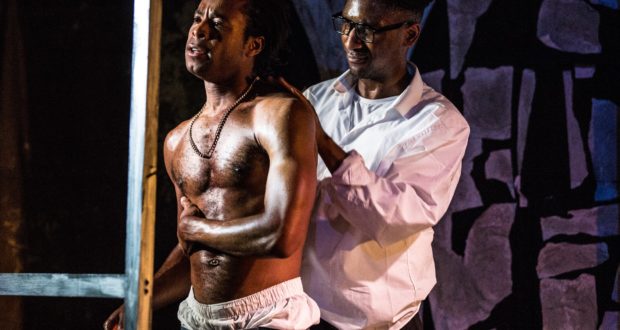Pros: Well-produced historical snapshots.
Cons: Few of the pieces really shine. Seven short plays effectively chart the course of recent gay history.
Summary
Rating
Good
It’s often said that an advantage of short play events is that if one misses the mark at least you don’t have to wait long for it to be over and done with. The seven pieces that comprise Outlaws to In-laws never fall below a decent standard, but sadly there are few instances of dramatic brilliance either.
Starting in the 1950s, there’s one play for each decade up to the present day. Beginning at the murky end of gay history, Philip Meeks’ Happy and Glorious is set on the day of Queen Elizabeth’s coronation, when homosexual acts carried a prison sentence and could spell the end of reputations and livelihoods. As a group of well-to-do friends observe the cheering crowds united in celebration, the isolation of the gay community is clear. The tension between those accepting the status quo and those who feel a rising urge to stand up and fight is effectively portrayed, but the piece is a bit talky and dramatically inert.
Gay men were still social and legal pariahs in 1965, the date of Jonathan Harvey’s Mister Tuesday. Peter (Jack Bence) is having a one-day-a-week affair with married Jimmy (Elliot Balchin) but longs to make the relationship more substantial. It was a common and heartbreaking situation at a time when the police were actively hunting and entrapping gay men, and blackmail was rife. This play is the high point of the evening: an emotionally and morally complex study of love and desperation. It’s brilliantly performed, expertly plotted, and poignantly focuses on the human cost of an oppressive state.
Gay love, class and racism are the themes of Reward by Jonathan Kemp. Set in 1977, the year of the Queen’s silver jubilee, uneducated skinhead Spike (Bence) and black academic Donald (Michael Duke) embark on an affair which they know would be shocking to their social groups if it was uncovered. This piece is tender and brutal by turns, if a little conventional in its presentation of social stereotypes.
Patrick Wilde’s 1984 is set in Brighton at the height of the Thatcher government, when AIDS was shocking the world and Section 28 was looming. A closeted Tory speech-writer is begged by his ex-lover to stand against his paymasters. The action in this play strains credulity, but at least there are some proper laughs in what has been a mostly dour evening thus far.
With that nice Mr Blair in power, things of course could only get better in 1997. Princess Die by Matt Harris brings a more experimental approach to the tale of a Diana-worshipping drag queen (Alex Marlow) and his fantasy life. It’s a nice change in tone but a bit frothy. By 2004 we’re into the internet age, but Topher Campbell’s Brothas doesn’t offer much insight into technology’s impact on sex and dating. Two vain friends shallowly explore online options and there’s a casual approach to selling sex for “coin”.
The final play is The Last Gay Play by Jushua Val Martin. This feels like it’s trying to be a farce but it’s too heavy-handed to really take off, exploring what gay marriage means in a vaguely optimistic but not particularly engaging way.
The historical journey of Outlaws to In-laws is its strength, providing shape and direction to the evening. There’s a versatile but wobbly set and some excellent performances from the multi-roling cast of six, with Bence and Marlow demonstrating extremely impressive skills and diversity. It’s a shame there are no female voices at all (a pitfall side-stepped by Mark Gatiss’ similarly themed Queers at the Old Vic recently) and the exclusive focus on the G of LGBTQ+ results in a somewhat narrow view of history.
Outlaws to In-laws is an evening of solid drama, perhaps in need of a more ambitious remit to produce something special rather than merely commemorative.
I’d like to thank whoever put the play titles and authors on the theatre’s website, as this information is bizarrely absent from the show’s 26-page programme.
Writers: Philip Meeks, Jonathan Harvey, Jonathan Kemp, Patrick Wilde, Matt Harris, Topher Campbell, Joshua Val Martin
Director: Mary Franklin
Producers: Making Productions, Bruno Wang Productions and King’s Head Theatre
Booking Until: 23 September 2017
Box Office: 020 7226 8561
Booking Link: https://kingsheadtheatre.ticketsolve.com/shows/873574190/events/128193084
 Everything Theatre Reviews, interviews and news for theatre lovers, London and beyond
Everything Theatre Reviews, interviews and news for theatre lovers, London and beyond



